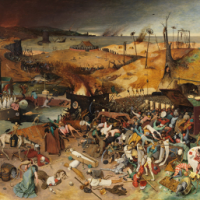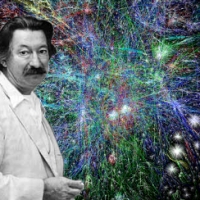The world according to Facebook
The majestic plural, the royal “we,” is deployed by individuals in high positions seeking to cast their own opinions as the views of a much larger group for whom they feel empowered to speak as a representative. Generally, it is worth approaching pronouncements using this “we” with a certain amount of skepticism. This measure of disbelief is warranted regardless of the source from whence this “we” emanates, be it an elected official, a religious leader, or the CEO of a major tech company. In short, when such a figure puts forth the pronouncement:
“Today I want to focus on the most important question of all: are we building the world we all want?”
One should be on guard.
The above quotation comes from the recent manifesto/business plan/mea culpa posted by, Facebook CEO, Mark Zuckerberg – it is a document that is rife with terms like “we,” “us,” and “our.” Writing in The Guardian, Olivia Solon has described Zuckerberg’s post (because the piece is, of course, really a Facebook post) as reading like “a state of the union address” – a point which has a particular resonance in a moment when the sense of what it means to “sound presidential” has recently been hit with a sledgehammer.
As would be expected, “Building Global Community” is a carefully constructed piece of sleek tech-PR: it lays out a concerned analysis of the state of the world, pays lip service to the shortcomings of the tech platform itself, pounds home a message couched in a vacuous feel-good faith in humanity, and advances a techno-utopian vision whereby Facebook is posed as the essential tool for “building the world we all want.” Granted, to say another thing about that pesky “we,” one thing which “Building Global Community” makes abundantly clear is that by “we” Zuckerberg really means Facebook – or to be a bit more critical, by “we” Zuckerberg really means himself. True, Zuckerberg is willing to engage in some critical analysis of the platform he heads, but if one wants to distill “Building Global Community” into a single point it is this: Facebook will save the world, whether you like it or not.
This is not to say that there is nothing of merit in Zuckerberg’s text. Indeed, what makes tech-company encyclicals like this so fascinating is the way in which such pronouncements hide the profit motive and desire for increased control behind a patina of seemingly sincere sentiments. Once more deploying that troubling “we,” Zuckerberg’s text wonders about “how do we help people build” communities that are “supportive,” “safe,” “informed,” “civically-engaged,” and “inclusive.” These are questions that many people are genuinely wrestling with at present – including many who are not the CEOs of tech companies – and many people seeking to build community may be finding themselves turning to digital spaces (like Facebook) to try to build such community. Capitalizing on that fact, the full text of “Building Global Community” redounds with tales of groups that Zuckerberg dubs “very meaningful,” and praises politicians who have taken to Facebook in order to better reach their constituents. Zuckerberg seems to be crowing with pride as he notes that the Women’s March all started because:
“a grandmother with an internet connection wrote a post that led her friends to start a Facebook event that eventually turned into millions of people marching in cities around the world.”
Such lines may furrow the brows of those who have been involved in activism and organizing – those who would say “it’s much more complicated than that” – but Zuckerberg’s lines are just the latest version of the ideology wherein tech saves the day. A sentiment that always manages to overlook the historical fact that the massive rights campaigns of the past were waged (often quite successively) without the use of social media platforms. Yet, one of the cardinal sins in technological society is daring to look backwards…
But isn’t this picture too sunny? Doesn’t Facebook bear some responsibility for the mess which Zuckerberg decries? Was not the Women’s March a reaction to the election of a demagogue who has risen to power thanks to his canny manipulation of social media? Sure, the aforementioned political figure’s medium of choice may be Twitter, but the vitriol and sensationalism that propelled him to his present parapet could be found on Facebook as well. For someone who loves to tout how his company is committed to making the world a better place, Zuckerberg is now having to contend with the recognition that his company may actually be making the world crummier. Thus, Zuckerberg’s encyclical expresses his acknowledgment of the problems in which Facebook is enmeshed, with Zuckerberg going so far as to admit that he “often” finds himself agreeing “with those criticizing us that we’re making mistakes.” This is hardly a stunning admission of guilt, and if Zuckerberg is engaging in self-flagellation than it is only with candy-floss, but Zuckerberg can clearly see that there is merit in framing himself as a leader who can recognize mistakes and accept criticism without throwing a tantrum.
Zuckerberg closes out “Building Global Community” with some pleasant platitudes that remind his readers that there have been dark times in history before but that people have overcome them by coming together and by building “social infrastructure like communities, media and governments.” And it is obvious that Zuckerberg is trying to situate himself and his company at the crux of this new “social infrastructure” – after all, the words that lead up to his conclusion are filled with ideas about how Facebook can improve “communities,” how it can help disseminate important (and real) “media,” and how it can better strengthen “governments.” One of Zuckerberg’s standard catchphrases is to speak of Facebook’s commitment to making “the world more open and connected” – and in his concluding lines Zuckerberg drops the royal “we” to instead thank “you” for “being part of this community.”
It’s all quite lovely and laudable, provided you don’t think about it too seriously.
Writing in 1968, in The Revolution of Hope, Erich Fromm warned that:
“If people are not aware of the direction in which they are going, they will awaken when it is too late and when their fate has been irrevocably sealed. Unfortunately, the vast majority are not aware of where they are going.” (Fromm, 27)
Fromm’s warning is darkly pertinent to Zuckerberg’s encyclical for two reasons. The first reason, which Zuckerberg himself acknowledges, is that a lack of foresight has meant that companies like Facebook have helped create the very mess from which they are now trying to extricate themselves. And it is worth bearing in mind that even if Zuckerberg and his acolytes did not have a clear sense of the direction Facebook was pushing things in, it can hardly be said that none were issuing such warnings – figures like Fromm (and many of his even more pessimistic milieu) were warning about the dangers of alienation in technologized consumer society decades before anyone created a Facebook account. Yet, it is the second reason that is more important, and it is the second reason that is slathered all over Zuckerberg’s text. Namely, under the guise of caring about community, inclusivity, and democracy – the vision that is put forth by Zuckerberg is in many respects profoundly authoritarian. True, it is a smiling authoritarianism that carries a smartphone instead of wearing jackboots, but behind that shimmering smile is the same love for control and the same public who are free only insofar as they act within the strictures of the dominant system to which they are expected to conform.
What “Building Global Community” puts forth is a vision of the future that isn’t a black boot stomping on a human face, but an algorithm constantly scanning over a human face. And though the image of the black boot may seem more frightening on a visceral level, it is worth bearing in mind that the dossier Facebook has on each of its members is much richer than that which would have been compiled by the black boot wearing secret police. Zuckerberg wants to build communities that are “supportive,” “safe,” “informed,” “civically-engaged,” and “inclusive” – but he clearly wants to do these within and under the watchful controlling gaze of Facebook. It cannot be repeated frequently enough that when individuals like Zuckerberg use the term “we” they are not necessarily including “you” – and when individuals like Zuckerberg drop terms with positive connotations like “supportive,” “safe,” “informed,” “civically-engaged,” and “inclusive” they do not necessarily mean these terms in the way that you understand them.
A term that pops up repeatedly in “Building Global Community” is “infrastructure.” Zuckerberg writes repeatedly about “social infrastructure,” and in bolded text near the start of his post he writes that:
“In times like these, the most important thing we at Facebook can do is develop the social infrastructure to give people the power to build a global community that works for all of us.”
Moving away from the already problematized use of terms like “we” and “us,” it is worth paying very close attention to what is going on in the above quotation. What is being expressed here is a really startlingly sized power grab, and a fairly impressive naked admission of this move: Facebook wants to be the “social infrastructure” of the “global community.” Think through the implications of that for a moment and it becomes pretty clear that what Zuckerberg is expressing is his ambition to make Facebook the basic “infrastructure” on which the “global community” rests – the key tool for people all around the globe. It is a shift from being “the social network” to “the social infrastructure.” And it is worth paying extra attention to the “global” aspect of all of this insofar as Zuckerberg’s smiling championing of “globalization” sounds a heck of a lot like old-fashioned imperialism and colonialism. After all, the history of colonialism features no shortage of instances of a powerful group imposing its technology – its infrastructure – and its vision of what “the social” should be, upon another people, whether they like it or not. Zuckerberg may write about wanting to be better aware of local community standards, but such a move is predominantly a gloss that functions to allow Facebook to become a part of those community standards. What is, not surprisingly, totally missing from “Building Global Community” is any recognition that there may be communities (and/or countries) that are not particularly interested in what Facebook has to offer. After all, Facebook’s “Free Basics” – a sort of proto-attempt to make Facebook the key bit of “social infrastructure” – was not met with universal adoration.
The key takeaway from this matter of “social infrastructure” is that if Facebook truly develops “the social infrastructure” for “all of us” than participation in “the social” comes to be reliant on participation in Facebook. Therefore, “supportive,” “safe,” “informed,” “civically-engaged,” and “inclusive” all become reliant upon a person partaking in Facebook. It is inclusive only insofar as it wants to include everyone in Facebook. With this document, Zuckerberg is expressing that Facebook doesn’t just want to be used for governance, it wants to be the governance. Furthermore, insofar as the present political situation allows Zuckerberg to sound like a leader (he does quote Lincoln at the end), it enables him to drive home the point that democracy is frail, but that tech CEOs are heroic.
And thus the central bizarreness of “Building Global Community” is that it is a document that expresses a starry-eyed adoration for democratic values, but does so in and around a platform over which users have no democratic control. And the points in the post wherein Zuckerberg discusses advances in AI only further indicates how the platform is taking more and more control away from the hands of humans, and by extension its pesky users. You can use Facebook in lots of different ways: you can plan a protest, post a video, join a “meaningful” group, hit like on a million different things, share articles, and argue with your third cousin with whom you have disparate political beliefs. You are encouraged to do all of those things – and you can do them insofar as the platform allows you to do so. Granted, at any moment (and without seeking your input) the platform can radically alter. True, Facebook can be used to organize a protest, but it would not be too difficult for Facebook to shut down your ability to do so. The important thing to remember is that Facebook’s users do not get to have a voice in how the platform is run, how the terms of service are changed, what the company does with their data, and users certainly don’t get a slice of all of that revenue they’re generating for Zuckerberg and his friends.
In his book The Sane Society, Erich Fromm lamented the alienation afflicting individuals in technologized consumer societies. And though Fromm did not deploy these exact terms, his work is animated by a sense that values like “supportive,” “safe,” “informed,” “civically-engaged,” and “inclusive” mean little against a backdrop of rampant control. As Fromm put it:
“We are surrounded by things of whose nature and origin we know nothing. The telephone, radio, phonograph, and all other complicated machines are almost as mysterious to us as they would be to a man from a primitive culture; we know how to use them, that is, we know which button to turn, but we do not know on what principle they function, except in the vaguest terms of something we once learned at school…We consume, as we produce, without any concrete relatedness to the objects with which we deal; we live in a world of things, and our only connection with them is that we know how to manipulate or to consume them.” (Fromm, 130)
And Facebook is definitely such a thing. Certainly, Facebook users may know something of the mythologized past of Facebook’s origin – but at present Facebook is largely just another “complicated machine” which is used, consumed, and manipulated in accordance with the wishes of the machine’s owner. And though it may be comforting to think of the ways in which Facebook can be used it is worth turning to yet another observation from from Fromm (The Fear of Freedom), that:
“There is also no strength in use and manipulation of objects; what we use is not ours simply because we use it.” (Fromm, 225)
And Facebook does not belong to “us” – and “us” is meant here to encompass those who use the platform but are not Zuckerberg (and his close circle of acolytes).
If Zuckerberg genuinely believes the things he writes in “Building Global Community,” believes them in a committed ethical way instead of merely as ideological spin to disguise a power grab, then he should recognize that democracy starts at home. This does not mean that Zuckerberg needs to be paying more attention to the United States, it means that Zuckerberg needs to pay more attention to Facebook itself. What better way would there be for Zuckerberg to demonstrate that he really means this stuff about “open and connected” than allowing Facebook’s users to have a say in running the platform? What better way for him to show that Facebook really can be a model for a more democratic future than allowing people to help shape that future? What better way for him to show that he cares about building communities that are “supportive,” “safe,” “informed,” “civically-engaged,” and “inclusive” than for him to realize that building such communities requires that the people in them have a say in how the core “social infrastructure” on which they depend is run? What better way to shore up democratic values than by democratizing technology?
Insofar as Zuckerberg will almost certainly (read: certainly) not be opening up Facebook to cooperative control he is showing that the company is really just a corporate fiefdom with authoritarian ambitions.
Zuckerberg may ask:
“Today I want to focus on the most important question of all: are we building the world we all want?”
But the “we” in that statement is just a stand in for the fantasies of another rich white man who believe that his marvelous toys will save the world.
Is the world that he wants really the world that we want? That’s a question that is worth asking. But it isn’t the one being posed by Mark Zuckerberg.
Works Cited:
Fromm, Erich. The Revolution of Hope. New York: Harper and Row, Publishers, 1968.
Fromm, Erich. The Sane Society. Routledge Classics, 2002.
Fromm, Erich. The Fear of Freedom. Routledge Classics. London: 2001.
Related Content
What Technology Do We Really Need?
A Charitable Definition of Charity
You Can’t Spell “Trending Topics” Without Control
Facebook Reactions are No Laughing Matter
When It Comes to Social Media – Is there no alternative?












Reblogged this on Quaerere Propter Vērum.
L’Facebook, c’est moi!
Reblogged this on As the Adjunctiverse Turns and commented:
Welcome to Facebookistan
Pingback: El mundo según Facebook | blog no oficial
Pingback: Here’s looking at you… | LibrarianShipwreck
Pingback: Who moderates the moderators? On the Facebook Files | LibrarianShipwreck
Pingback: Zachary Loeb — Who Moderates the Moderators? On the Facebook Files | boundary 2
Pingback: The users and the used | LibrarianShipwreck
Pingback: Amazon is hungry for more | LibrarianShipwreck
Pingback: It’s time to fix things – a review of “Move Fast and Break Things” | LibrarianShipwreck
Pingback: The future looks expensive | LibrarianShipwreck
Pingback: The Sorcerer’s Apprentice 2.0 | LibrarianShipwreck
Pingback: Betrayed by the giants | LibrarianShipwreck
Pingback: Be Wary of Silicon Valley’s Guilty Conscience: on The Center for Humane Technology | LibrarianShipwreck
Pingback: Facebook – to delete, or not to delete? | LibrarianShipwreck
Pingback: Facebook: ¿Borrarse o no borrarse? | No oficial
Pingback: The Nerd and the Inured | LibrarianShipwreck
Pingback: Techlash! What Techlash? | LibrarianShipwreck
Pingback: Facebook ≠ Democracy | LibrarianShipwreck
Pingback: Facing Facebook | LibrarianShipwreck
Pingback: Flamethrowers and Fire Extinguishers – a review of “The Social Dilemma” | LibrarianShipwreck